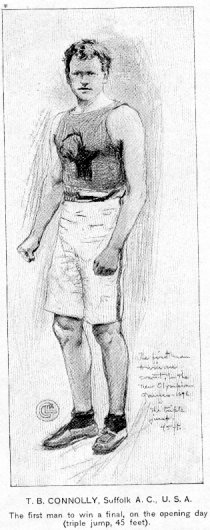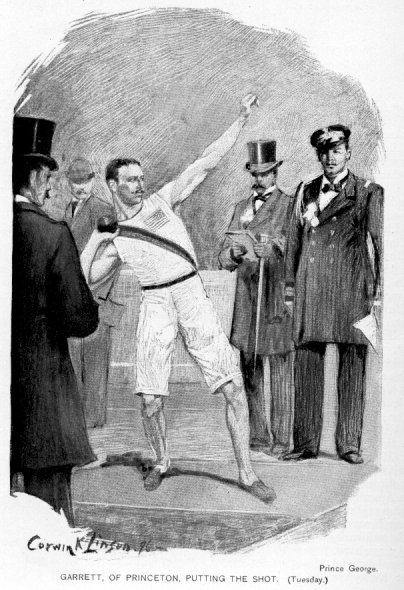America at the First Modern Olympics
Today, amateur America goes to its first Olympic Games. The University of Houston's College of Engineering presents this series about the machines that make our civilization run, and the people whose ingenuity created them.
By the 6th century BC, athletic games were regular events in Greece. The Olympic Games might be the oldest of those. The first records we have of Olympic champions are from 776 BC. The games themselves were probably hundreds of years older still.
The earliest contest was a 200-yard run. Later, more games were added: horse races, other foot races, wrestling, javelin, discus. Women weren't allowed to compete or even watch. As the games grew, fat purses replaced olive wreaths. Athletes turned professional. Rome made major spectacles of the games. Finally the Christian Emperor Theodosius was fed up with the pagan and commercial quality of the games. He abolished them in 393 AD.
They stayed dead for 1500 years. Then, in 1892, a young French aristocrat, Pierre de Coubertin, called for an Olympic revival. He believed the games would create international harmony. His efforts led to the first modern Olympics in Athens, in 1896. The King of Greece opened the new games.
America took no official interest, but writer Bob Fulton tells how 13 American athletes went to Athens on their own. (Compare that with 700 American athletes going to the 1996 games.)
Harvard student James Connolly was the first to decide he'd go. He asked for a leave of absence and his dean said, "No!" Connolly, forced to drop out of Harvard, never forgave the school.
The Boston Athletics Association sent five athletes. One was Thomas Burke, who ran the 440. He was the only national champion who went. The rest were simply people who wanted to compete. All had to dig up the money to get there. These 13 colonists of the new Olympics boarded the tramp steamer Fulda and set off for Athens.
In Naples, they learned that Greece was on the old Julian calendar. The games, scheduled for April 6, would begin on March 25th by Western reckoning. There was nothing to do but to cross Italy, catch a ship to Patras, and make a 10-hour train ride that reached Athens the day before the games. There they faced a grueling welcoming ritual with hours of speeches in Greek and toasts over cups of retsina. They arrived at the games bone-weary, hung over, with no hope of doing well. Then -- a miracle occurred.
Connolly won the first modern Olympic gold medal in the triple jump. During the next days those 13 Americans (and two more who traveled separately) won 11 gold medals -- the most by any country.
Robert Garrett, from Princeton, competed in several events. The discus was unknown in America so he had a blacksmith fashion one like those in Greek art. It weighed 20 pounds -- much too heavy to throw. Once in Greece, he found that a modern discus only weighed five pounds. He practiced with one for a few days. Then he dethroned the Greek champion. Garret came home with four gold medals.
Today the games are played by athletes who are professional in everything but pay. It's a different world -- one whose glory is hard pressed to match those wonderful amateurs, a century ago.
I'm John Lienhard, at the University of Houston, where we're interested in the way inventive minds work.
(Theme music)
Fulton, B., Our First Olympics. American Heritage, July/August, 1996, pp. 52-60.
Richardson, R. B., The New Olympian Games. Scribner's Magazine, September, 1896, pp. 267-286.
See also the Encyclopaedia Britannica article "Olympic Games."


Contemporary drawings by C. K. Linson from the Richardson article cited above.